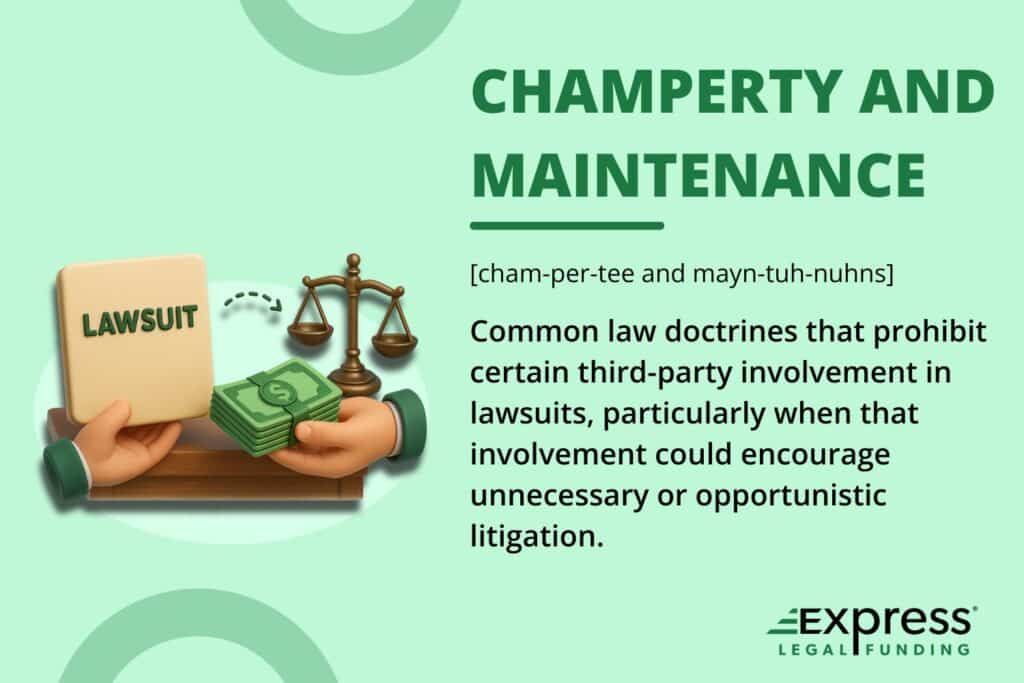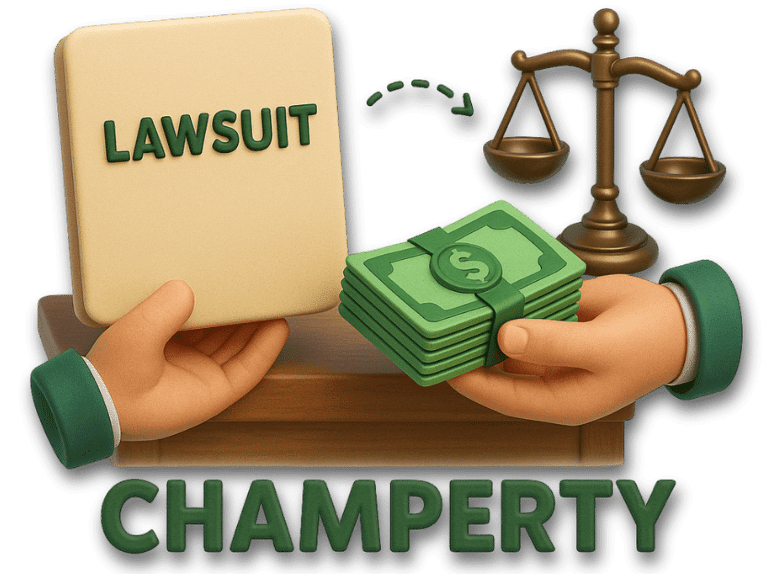The doctrines of champerty and maintenance originated in medieval England as part of common law efforts to preserve the integrity of the courts. At the time, powerful landowners and wealthy individuals could manipulate the legal system by funding lawsuits for their own gain, stirring up quarrels, or pressuring weaker parties into litigation.
Champerty referred to outside financing of lawsuits in exchange for a share of the recovery, while maintenance referred more broadly to improper interference in another person’s case.
These doctrines were designed to prevent frivolous lawsuits, exploitation of vulnerable plaintiffs, and corruption of judicial proceedings. By outlawing third-party involvement, courts sought to ensure that litigation remained a tool for resolving genuine disputes rather than a business opportunity for speculators.
In modern times, the strict application of champerty and maintenance has faded in many jurisdictions. Some states in the United States still restrict champertous agreements, while others have reformed or abolished the doctrines altogether, particularly as litigation funding and pre-settlement financing have become more common.
In England and Wales, reforms have limited their scope, but courts may still set aside agreements that threaten the fairness of the legal process.
Today, champerty and maintenance continue to appear in legal discussions about third-party litigation funding, attorney ethics, and the balance between access to justice and protection against abuse of the courts.
Understanding these doctrines is essential for recognizing how legal systems regulate outside involvement in lawsuits and why some jurisdictions remain cautious about permitting it.

What is Champerty?
Champerty is an agreement in which a third party finances another person’s lawsuit in exchange for a portion of the settlement or judgment if the case is successful. Historically, this was viewed as an abuse of the legal system because it encouraged speculative litigation and allowed outsiders to profit from disputes in which they had no natural interest.
What is Maintenance, and how is it different from Champerty?
Maintenance occurs when someone improperly supports or encourages another person’s lawsuit even though they have no direct legal interest in the case. Unlike champerty, maintenance does not always involve a financial agreement.
For example, a person might provide resources, staff, or influence to help someone pursue litigation against a rival, even when they are not personally involved in the dispute.
Why were Champerty and Maintenance banned historically?
Both doctrines were prohibited under common law to prevent manipulation of the courts. The goal was to stop outsiders from:
- Exploiting vulnerable plaintiffs.
- Stirring up unnecessary or frivolous lawsuits.
- Using litigation as a tool for financial speculation or personal vendettas.
Are Champerty and Maintenance still illegal today?
The answer depends on the jurisdiction. In the United States, some states still restrict champertous agreements, while others have abolished the doctrines, particularly as litigation funding becomes more common and regulated. In England and Wales, the traditional rules have been relaxed, but courts may still strike down agreements that undermine the administration of justice.
Can a champertous agreement be enforced?
A champertous agreement can be enforced if it is not prohibited in the jurisdiction where the case is heard. Many states and countries have abolished or narrowed the old doctrines of champerty and maintenance, which allow properly structured commercial litigation funding agreements to be valid and enforceable.
However, in jurisdictions where champerty remains prohibited, such contracts are typically void, and courts will refuse to uphold them if they interfere with the proper administration of justice.
Why are these legal doctrines still important today?
Champerty and maintenance highlight the ongoing tension between promoting access to justice and preventing abuse of the legal system. Even as modern laws evolve, the doctrines remain central to debates about litigation funding, attorney ethics, and whether third-party involvement helps or harms the fairness of lawsuits.
Jurisdiction-Specific Treatment of Champerty and Maintenance
The enforceability of champerty and maintenance varies widely depending on the jurisdiction. Some regions continue to recognize the doctrines, while others have abolished or reformed them in light of modern litigation funding practices.
United States
- Still Restricted: A handful of states, including New York, maintain strict prohibitions against champertous agreements, though enforcement is limited to narrow circumstances.
- Abolished or Reformed: Many states, including California, Minnesota, and Texas, have effectively abolished champerty and maintenance as defenses, clearing the way for regulated litigation funding.
England and Wales
Champerty and maintenance are no longer crimes or torts, but courts may still invalidate agreements that undermine the fairness or integrity of the legal process. The doctrines survive in a limited form to prevent abuse of the judicial system.
Other Common Law Jurisdictions
- Australia: Most states have abolished champerty and maintenance as crimes or torts, but courts retain the power to intervene if a funding agreement is found to be an abuse of process.
- Canada: Rules vary by province. For example, Ontario has expressly allowed litigation funding under certain guidelines, provided agreements are fair and reasonable.
Key Point: Whether a champertous agreement can be enforced depends entirely on the jurisdiction. Some regions still view such contracts as void, while others recognize them as valid if properly structured and regulated.
Key Cases on Champerty and Maintenance
- Campbell v. Hall (1774, England)
This early case reaffirmed limits on improper interference in lawsuits, reflecting how English courts sought to protect the legal system from corruption by outsiders. - Saladini v. Righellis, 426 Mass. 231 (1997, U.S.)
The Massachusetts Supreme Judicial Court rejected the strict ban on champerty, holding that a litigation funding agreement could be valid if it was not unfair, oppressive, or against public policy. This decision helped pave the way for modern litigation finance in the United States.
Examples of Champerty and Maintenance
Example of Champerty: A wealthy investor agrees to cover a plaintiff’s legal fees in a personal injury lawsuit in exchange for 40% of any recovery. This is champerty because the outsider is funding the lawsuit solely for profit.
Example of Maintenance: A business owner, hoping to harm a competitor, encourages a friend to sue that competitor and provides office space and staff support. The business owner has no direct stake in the case but interferes for personal motives.
Modern Contrast: Pre-settlement funding companies avoid champerty and maintenance by using non-recourse agreements, where repayment is only required if the plaintiff wins. The intent is to provide financial relief during litigation for daily living costs, not to improperly influence legal strategy or encourage lawsuits.
Conclusion on Champerty and Maintenance
Champerty and maintenance began as medieval doctrines meant to protect courts from abuse, but their role has changed significantly in modern law. While many jurisdictions have abolished or reformed these prohibitions, the doctrines remain important in understanding the boundaries of third-party involvement in litigation.
Today, they continue to shape debates over litigation funding, legal ethics, and the balance between access to justice and preventing misuse of the courts.

